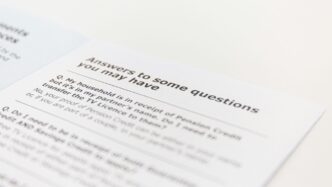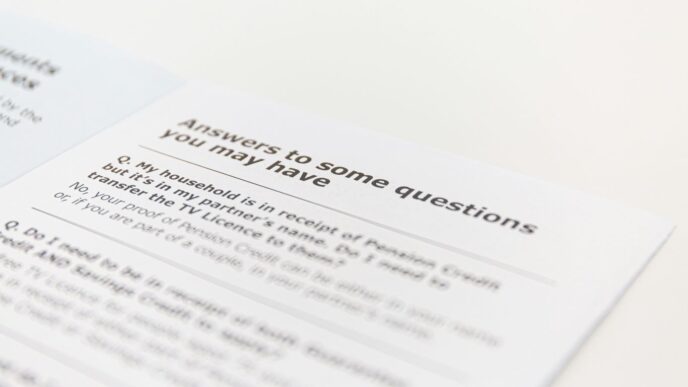So, you’ve had a job interview. Great! Now what? It’s easy to think the hard part is over, but there’s one more step that can really make you stand out: the thank you email. And honestly, getting the subject line right is more important than you might think. It’s the first thing the hiring manager sees, and it needs to grab their attention in a good way. We’ll cover how to nail that interview thank you subject line.
Key Takeaways
- A clear interview thank you subject line helps your email get opened and noticed quickly.
- Personalizing your subject line with your name and the job title is a good practice.
- Keep your subject line brief, professional, and easy to understand.
- Avoid generic phrases; try to reference something specific if possible.
- Sending a thank you email promptly shows your continued interest and professionalism.
The Importance of a Strong Interview Thank You Subject Line

So, you’ve nailed the interview – congrats! But don’t stop there. The follow-up email, especially that subject line, is your last chance to make a good impression before they make a decision. Think of it as your final handshake, but in their inbox. It’s not just about saying thanks; it’s a strategic move.
Why Your Interview Thank You Subject Line Matters
This little line at the top of your email is surprisingly important. It’s the gatekeeper to your entire message. If it’s boring or confusing, your thoughtful email might just get lost in the shuffle. A strong subject line gets your email opened, read, and remembered. It shows you’re professional and you care about the opportunity. Plus, hiring managers are swamped with emails, so making yours stand out is key.
Making a Memorable First Impression
Even though it’s a thank you email, it’s still part of the interview process. It’s your chance to reinforce your interest and show you’re a detail-oriented person. A well-crafted subject line, paired with a great email, can really set you apart from other candidates who might skip this step altogether. It’s a small effort that can have a big payoff.
Standing Out in a Crowded Inbox
Let’s be real, recruiters and hiring managers get a ton of emails every day. Yours needs to be easily identifiable and compelling enough to click on. If your subject line is generic, like "Thank You," it might blend in with dozens of others. But if it’s specific and professional, it tells them exactly who you are and why you’re emailing, making it much easier for them to find and prioritize your message.
Key Elements of an Effective Interview Thank You Subject Line
So, you’ve nailed the interview, and now it’s time for the follow-up. The subject line of your thank-you email might seem small, but honestly, it’s a pretty big deal. Think about it: recruiters and hiring managers get tons of emails every single day. Yours needs to stand out, right? It’s your first real chance to make a good impression after the interview itself. A well-crafted subject line is like a friendly wave in a crowded room – it gets you noticed.
Clarity and Conciseness
First things first, make it super clear what the email is about. Nobody wants to guess. A subject line that’s too vague, like "Checking in," just gets lost. You want something that immediately tells the recipient, "Ah, this is that candidate I met." Keep it short and to the point. Something like "Thank You – [Your Name] – [Job Title]" is a solid start. It’s direct and tells them exactly who you are and why you’re emailing. It’s a simple way to make sure your message isn’t overlooked in a busy inbox. Remember, recruiters are often sifting through stacks of applications, so making their job easier is always a good move. A clear subject line is a small step that shows you’re organized and considerate of their time. It’s a good idea to send your thank you email within 24 hours of your interview.
Personalization for Impact
Generic subject lines are okay, but personalized ones? Those are gold. If you can, try to weave in something specific from your conversation. It shows you were really listening and engaged. Maybe you discussed a particular project, a company value, or even a shared interest. Adding a brief mention of this can make your subject line much more memorable. For example, "Following Up – [Your Name] – Discussing the Marketing Strategy" is way more engaging than just "Thank You." It immediately sparks recognition and reminds them of your specific interaction. This little touch can make a big difference in how your email is perceived.
Including Your Name and the Position
This is non-negotiable, really. Always, always include your full name and the specific job title you interviewed for. Why? Because hiring managers often interview for multiple roles, and they might not remember every single candidate’s face or name right away. Providing this information in the subject line acts as an instant identifier. It helps them quickly sort through emails and locate yours when they need it. Think of it as a helpful tag. So, a subject line like "Interview Follow-Up: [Your Name] for [Job Title]" is perfect. It’s professional, informative, and makes it easy for them to connect the email to the right candidate and role.
Crafting Specific Interview Thank You Subject Lines
So, you’ve had the interview, and now it’s time to follow up. The subject line of your thank you email is your first real chance to make a good impression after you’ve met. It’s like the handshake of your email – it sets the tone. You want it to be clear, professional, and maybe even a little bit memorable. Think about it, hiring managers get a ton of emails every day. Yours needs to stand out, but not in a weird way. It needs to be easy to spot and understand immediately what it’s about.
Direct and Professional Options
Sometimes, the best approach is just to be straightforward. This is especially true if the company culture seems pretty formal. You can’t go wrong with something that clearly states who you are and why you’re emailing. It’s efficient and leaves no room for confusion.
Here are a few ways to do that:
- Thank You – [Your Name] – [Job Title]
- Following Up: [Job Title] Interview – [Your Name]
- Interview Follow-Up: [Your Name]
Enthusiastic and Engaging Subject Lines
If the interview felt a bit more relaxed, or if you really want to show off your personality and excitement, you can try something a little more engaging. This shows you’re not just going through the motions; you’re genuinely thrilled about the possibility.
Consider these:
- Great Speaking with You Today! – [Your Name]
- Excited About the [Job Title] Opportunity – [Your Name]
- Following Up – Enjoyed Our Chat About [Specific Topic]!
Referencing Specific Interview Details
This is where you can really make your email pop. Mentioning something specific from your conversation shows you were paying attention and that the interview made an impact on you. It makes the email feel less like a generic template and more like a personal note.
Try something like:
- Thank You – [Your Name] – Discussing [Specific Project/Topic]
- Following Up: [Job Title] Interview – Loved Hearing About [Company Initiative]
- Great Meeting You, [Interviewer’s Name]! – [Your Name]
Subject Line Strategies for Different Interview Types
So, you’ve had your interview, whether it was over the phone, in person, or through a screen. Now comes the follow-up, and the subject line is your first real chance to make a good impression after the interview. It’s not just about saying thanks; it’s about reminding them who you are and why you’re a great fit, all before they even open the email.
Following Up After a Phone Interview
Phone interviews are often the first hurdle. Since you didn’t meet face-to-face, your subject line needs to be extra clear about who you are and what you interviewed for. Think about it: the hiring manager might have spoken to a dozen people that day. You want to make it easy for them to find your email and remember your conversation.
- Keep it simple and direct: They need to know immediately what the email is about.
- Include your name and the position: This is non-negotiable. It helps them sort through their inbox.
- Mention the date or time: If you interviewed earlier in the day, adding that can help jog their memory.
Here are a few examples:
- Thank You – [Your Name] – [Job Title]
- Following Up: [Your Name] – [Job Title] Interview
- Thank You – [Your Name] – [Job Title] (Phone Interview)
Post-In-Person Interview Subject Lines
Meeting someone in person adds a personal touch, but the follow-up still needs to be professional. You can afford to be a little more specific here, maybe referencing something you discussed, but clarity is still king. You want to make sure your email stands out from any other thank-yous they might receive.
- Reference the specific role: Always include the job title you interviewed for.
- Add your name: Again, this is for easy identification.
- Consider a subtle nod to your conversation: If you had a particularly memorable chat, you could hint at it, but keep it brief.
Examples:
- Thank You – [Your Name] – [Job Title] Interview
- Following Up: [Your Name] – [Job Title] Discussion
- Great Speaking with You – [Your Name] – [Job Title]
Thank You Subject Lines for Virtual Interviews
Virtual interviews are the norm these days, and they can sometimes feel a bit less personal than in-person meetings. Your subject line is your chance to bridge that gap. You still need to be clear and professional, but you can also inject a bit more personality if it fits the company culture. Think about what makes your email easy to spot and open.
- Be clear about the purpose: Let them know it’s a thank you.
- Include identifying details: Your name and the position are essential.
- A touch of enthusiasm: If appropriate, a slightly more energetic subject line can work.
Examples:
- Thank You – [Your Name] – [Job Title] Interview
- Following Up: [Your Name] – [Job Title]
- Enjoyed Our Virtual Chat – [Your Name] – [Job Title]
Common Pitfalls to Avoid in Your Subject Line

So, you’ve nailed the interview, and now it’s time for the thank-you email. Easy, right? Well, not so fast. The subject line is your first, and sometimes only, chance to make a good impression with this follow-up. Messing it up can mean your email gets ignored, or worse, sent straight to the spam folder. Let’s talk about what not to do.
Generic or Vague Subject Lines
This is probably the biggest mistake people make. Sending something like "Thank You" or "Following Up" is just asking to be overlooked. The hiring manager is likely getting dozens, if not hundreds, of emails a day. They need to know immediately who you are and why you’re emailing. Think of your subject line as a mini-headline that needs to grab attention and provide context. Without it, your email just blends into the background noise. It’s like showing up to a party and not introducing yourself – people have no idea who you are or why you’re there. Make sure your subject line clearly states your purpose and identifies you. For example, instead of "Thank You," try "Thank You – [Your Name] – [Job Title]." This simple addition makes a huge difference in getting your email noticed.
Typos and Grammatical Errors
This one seems obvious, but you’d be surprised how often it happens. A typo or a grammatical slip-up in your subject line can make you look careless and unprofessional. It suggests you didn’t take the time to proofread, which can raise concerns about the quality of your work if you were to get the job. Imagine applying for a detail-oriented role and your thank-you email subject line has a glaring error – not a great first impression, right? Always double-check your spelling and grammar before hitting send. It’s worth taking an extra minute to ensure it’s perfect.
Overly Casual or Unprofessional Tone
While company culture can vary, it’s generally best to err on the side of professionalism in your initial follow-up. Using slang, emojis, or overly familiar language in your subject line can come across as unprofessional, especially if you don’t know the interviewer well or if the company culture is more formal. For instance, something like "Hey! Thanks for the chat! :)" is probably not the best approach. Stick to clear, polite, and professional language. You want to convey enthusiasm, but also respect for the interviewer’s time and the hiring process. Keep it straightforward and focused on the purpose of your email.
Best Practices for Sending Your Thank You Email
Sending your thank you email promptly and professionally is a big deal. It’s your last chance to make a good impression after the interview, and honestly, it shows you’re serious about the job. Most people don’t send thank you notes, so doing it can really set you apart.
Timeliness of Your Follow-Up
You should aim to send your thank you email within 24 hours of your interview. This shows you’re eager and that you value their time. Think of it like this: the sooner you send it, the fresher the conversation is in everyone’s mind. If you interviewed on a Friday, sending it that evening or first thing Monday morning is usually a good plan. It’s better to send it a little early than too late.
Proofreading Your Subject Line and Email
Seriously, don’t skip this step. A typo in your subject line or email can make you look careless, and that’s not the vibe you want to give off. Read it over at least twice. Maybe even read it aloud to catch awkward phrasing. Check for spelling mistakes, grammar errors, and make sure you’ve got the interviewer’s name and the company name spelled correctly. It sounds basic, but it’s super important.
Tailoring Your Subject Line to the Company Culture
Think about the company you interviewed with. Was it a super formal, buttoned-up environment, or more relaxed and casual? Your subject line should kind of match that. For a more traditional company, stick to something straightforward like "Thank You – [Your Name] – [Job Title]". If the interview felt more laid-back, you might get away with something a bit more personal, but always keep it professional. When in doubt, err on the side of being more formal. It’s always better to be a little too professional than not professional enough.
Wrapping It Up
So, that’s the lowdown on thank you emails after interviews. It might seem like a small thing, but it really can make a difference. Sending one shows you’re serious about the job and that you pay attention. Plus, it’s your chance to remind them why you’re a good pick. Just keep it simple, honest, and send it pretty quickly after you talk to them. You’ve got this!
Frequently Asked Questions
Why is the subject line of a thank you email so important?
The subject line is like the title of your email. It’s the first thing the person reading it sees, so it needs to be clear and grab their attention. A good subject line helps the hiring manager know who you are and why you’re emailing, making it easier for them to find and read your message.
When should I send my thank you email after an interview?
You should send a thank you email within 24 hours after your interview. Sending it too late might make it seem like you’re not very interested in the job.
What information should I definitely put in my subject line?
It’s best to include your name and the job title you interviewed for. This helps the hiring manager remember you and know which job you’re talking about, especially if they’re interviewing many people.
Can I mention something specific from the interview in my subject line?
Yes, you can. Mentioning something specific you talked about during the interview shows you were listening and are genuinely interested. It makes your email more personal and memorable.
What kind of subject lines should I avoid?
Avoid using subject lines that are too casual, like ‘Hey!’ or ‘Thanks!’. Also, stay away from typos or spelling mistakes, as these can make you look unprofessional. Keep it polite and to the point.
Can you give me an example of a good subject line?
A good subject line is clear, includes your name and the job title, and maybe a brief mention of your interest. For example, ‘Thank You – [Your Name] – [Job Title]’ or ‘Following Up – [Your Name] for [Job Title]’ are good options.














